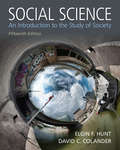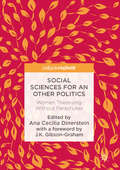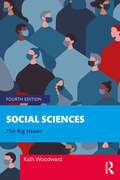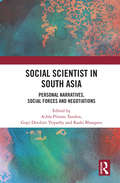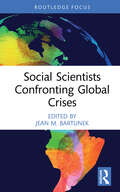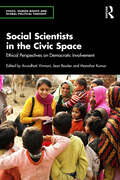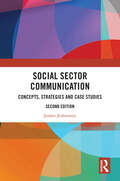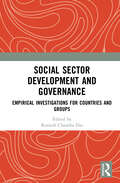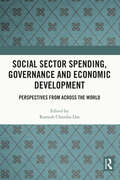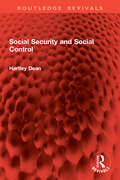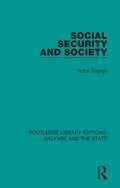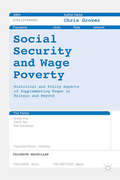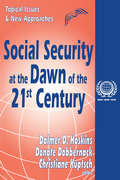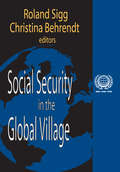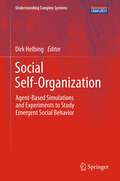- Table View
- List View
Social Science: An Introduction to the Study of Society -- Pearson eText
by David C. Colander Elgin F. HuntSocial Science, 15/e, approaches social science from a common-sense perspective, rather than from a conventional social science angle. Readers will see how seemingly diverse disciplines intermingle – anthropology and economics, for example. In the end, students will be able to approach social issues with unbiased problem-solving skills.
Social Sciences for an Other Politics
by Ana Cecilia DinersteinThis book opens up a unique intellectual space where eleven female scholar-activists explore alternative forms of theorising social reality. These'Women on the Verge' demonstrate that a new radical subject- one that is plural, prefigurative, decolonial, ethical, ecological, communal and democratic- is in the making, but is unrecognisable with old analytical tools. Of central concern to the book is the resistance of some social scientists, many of them critical theorists, to learning about this radical subject and to interrogating the concepts, methodologies and epistemologies used to grasp it. Echoing the experiential critique of capitalist-colonial society that is taking place at the grassroots, the authors examine how to create hope, decolonise critique and denaturalise society. They also address the various dimensions of the social (re)production of life, including women in development, the commons, and nature. Finally, they discuss the dynamics of prefiguration by social movements, critiquing social movement theory in the process. This thought-provoking edited collection will appeal to students and scholars of gender studies, social, Marxist and Feminist theory, postcolonial studies and politics.
Social Sciences: The Big Issues
by Kath WoodwardFully revised and updated, the fourth edition of Social Sciences: The Big Issues explores key debates about how we live our personal, domestic and emotional lives at a time of enormous, previously unimaginable change and disruption, including a pandemic that locked down households and economies. Since the third edition, everyone’s life has changed. The pandemic – at least temporarily – stopped social life as we knew it and virtually forced governments to close down their economies. This is where this edition of The Big Issues starts. Staying at home posed a radical departure from routine life, but reactions to Covid-19 have exposed the endurance of particular social relations – especially inequalities – which characterize societies worldwide. A few of the new big issues covered in this edition include: Changing selves and personal lives in light of racism and sexual and identity politics in a pandemic Changing patterns of consumption in relation to market production and what it means for climate change Changing intersections of citizenship, migration and globalization in the context of the virus crossing borders, and both the opportunities and sources of inequality involved Changing ideas about power, politics and populism in the aftermath of Brexit Building on the strong foundation of this well-loved text, this fully revised fourth edition explores how big issues and social forces intersect to create both change and evidence of continuity, especially of social inequalities. It provides a clear, accessible introduction to the ideas and approaches of the social sciences across a range of disciplines, including sociology, psychology and politics.
Social Scientist in South Asia: Personal Narratives, Social Forces and Negotiations
by Achla Pritam Tandon Gopi Devdutt Tripathy Rashi BhargavaThis book is a collection of autobiographical narratives by leading social scientists working across South Asia. It explores the linkages between their personal experiences and academic pursuits and analyzes how personal, political, and professional choices shape knowledge production and effect social transformation. The narratives revisit long-standing debates on objectivity, subjectivity, self, and other and attempt to collapse the binaries that have informed the social sciences until now. Highlighting the state of research and pedagogy in the social sciences in the region, the book questions the conventional understanding of the task of the social scientist and, in doing so, blurs the distinction between theory, research, pedagogy, and activism. A unique and compelling contribution, this volume will be indispensable to students and researchers of sociology, anthropology, history, creative writing, education, politics, biography studies, and South Asian studies. It will also be of interest to general readers.
Social Scientists Confronting Global Crises
by Jean M. BartunekThis book arose out of a "rant" by Ed Schein in 2020 arguing that Social Scientists need to address global crises. That is, social scientists develop knowledge that is directly pertinent to global challenges and crises, and need to be included in initiatives taken to address them. They must present our knowledge in in public forums and our voices need to be heard by others. This book is a step towards such presentation and involvement. Social scientists understand ways global crises are crucially intertwined with our relationships, groups, organizations, communities, institutions, how they collaborate with each other, how they compete with each other, and the dynamics intermingled with these. These dimensions are inadequately addressed by scientists and insufficiently recognized by other stakeholders. The social scientists whose work is included in this book are associated with management, and have foundational training in all the social science disciplines. They are highly respected internationally. Their work highlighted here contributes to deep understandings of social phenomena associated with global crises. It also demonstrates skilled ways of intervening among those dealing with challenges and crises first-hand. Finally, it also shows the ongoing personal development required to address global crises in productive ways. This book will be of interest to social scientists, researchers, academics and students in the fields of management, especially those focusing on global challenges and crises. It will also be a useful resource for practitioners and policy makers.
Social Scientists Meet the Media
by Alan Bryman Cheryl Haslam"Part chronicle, part analysis and part advice manual, Social Scientists Meets the Media combines the thoughts of academics and media people to produce a vivid and valuable series of accounts that will prove of service to all academics seeking a wider audience but wary of the terra incognita they face in finding one" Ellis Cashmore, Staffordshire UniversitySocial Scientists know they are in a dilemma: their work may fall prey to sensationalism, but at the same time they don't want to be overlooked. Social Scientists Meet the Media collects the experiences of academics who have sought to publicize their research. It contains personal accounts from social scientists with extensive media contact and representatives from radio, television and the press. Based on these often humorous and sometimes chastening accounts, the editors suggest ways to achieve a more fruitful relationship between social scientists and the media.
Social Scientists in the Civic Space: Ethical Perspectives on Democratic Involvement (Ethics, Human Rights and Global Political Thought)
by Arundhati Virmani, Jean Boutier, and Manohar KumarThe book explores the stakes for the social sciences around four central problems: the challenges of context; modes of intervention; involvement; and the ethical dilemmas for the scholar in a democratic space. The first, challenges of the context, examines the variety of situations confronted by scholars since the beginning of the 20th century. These include their interventions in key judicial affairs, the impact of technological developments like the introduction of big data, or even the positionality of the scholar. Second, the book investigates the modalities according to which social scientists may intervene in the civic space: in particular as specialists, as experts, or in the media. A third problem brings together some cases illustrative of researchers’ involvement in critical issues, such as food policies, major social reforms, or gender-related questions. Finally, the book concludes with a reflection on the modes of exercising critique or dissent in democratic societies and on the ethical dimensions of involvement in the civic space.A searing examination of the role of social scientists, as they are called upon to address the multiple critical issues faced by contemporary societies, from pandemics to climatic change, sustainable development, migration, ethnicity, or the place of religion. This volume will be of great interest not just to scholars, students, and researchers of the social sciences but to the general reader as a concerned citizen.
Social Sec: Beveridge And After (International Library of Sociology)
by George VictorFirst Published in 1998. Routledge is an imprint of Taylor & Francis, an informa company.
Social Sector Communication: Concepts, Strategies and Case Studies
by Jaishri JethwaneyCommunication, advocacy, and outreach are germane to the success of any organisation working in the social sector. This book provides a robust conceptual framework that is required to understand the demands of the sector and suggests strategies and tools for those engaged in social sector communication.This book not only highlights the theoretical underpinnings, practice, and skill of social sector communications in India but also provides an understanding of various skills and approaches required in communication including social marketing, media advocacy, social mobilisation, grassroots communication, and corporate social responsibility (CSR). With the aid of case studies, it offers suggestions on how to plan campaigns; write a concept note, field report, and press release, and effectively use social media to achieve developmental programme goals. This revised edition discusses the different perspectives of NGOs and programme implementers and helps in understanding the corporate–NGO interface vis-à-vis CSR projects.This book will be useful to students of social work, business, and management preparing for roles in social enterprises. It will also be of use to working professionals in the social sector.
Social Sector Development and Governance: Empirical Investigations for Countries and Groups
by Ramesh Chandra DasThis volume explores the impact of good governance upon social sectors&’ development in India and other selected economies of the world. Economic development in the true sense depends on the development of different social sectors like education, healthcare, gender equality, etc., as well as economic factors. Good governance makes the sectors perform well on the one hand, and helps in economic growth and development on the other. Conversely, bad or weak governance in the form of corruption and low effectiveness of the governments, may lead to poor performance of the sectors, and low growth and backwardness of the economies. This book explores the associations between different social sectors&’ performances with quality of governance, and growth and development of different economies and groups in detail and establishes theoretical and empirical examinations for the individual economies and groups from the different corners of the globe with the help of new theories and latest data. This book will be useful for students and researchers in the fields of Economics, Sociology, Political Studies, Public Finance, International Relations, Social Sciences as well as policy makers and think tanks.
Social Sector Spending, Governance and Economic Development: Perspectives from Across the World
by Ramesh Chandra DasEconomic development depends heavily on the growth of social sectors like education, healthcare, gender equality, as well as factors like income, consumption, investment and trade. This book examines the interlinkages between development, good governance and spending on social growth. The book focuses on different areas of social growth, public welfare and poverty reduction including managing human resources, corruption in public institutions and public spaces as well as health and welfare measures. The chapters in the volume highlight the role of government interventions in boosting human development – particularly in developing countries in Asia and Africa and many developed countries in the post-COVID scenario. The book also examines the foundations of government spending on development and effective governance while underlining the impact which social growth has on the economy. Rich in theoretical and empirical perspectives, this book will be useful for students and researchers of economics, sociology, political studies, public finance, development studies as well as for policymakers and think tanks working in the areas of human development.
Social Security Programs and Retirement around the World: Disability Insurance Programs and Retirement (National Bureau Economic Research)
by David A. WiseEven as life expectancy in many countries has continued to increase, social security and similar government programs can provide strong incentives for workers to leave the labor force when they reach the age of eligibility for benefits. Disability insurance programs can also play a significant role in the departure of older workers from the labor force, with many individuals in some countries relying on disability insurance until they are able to enter into full retirement. The sixth stage of an ongoing research project studying the relationship between social security programs and labor force participation, this volume draws on the work of an eminent group of international economists to consider the extent to which differences in labor force participation across countries are determined by the provisions of disability insurance programs. Presented in an easily comparable way, their research covers twelve countries, including Canada, Japan, and the United States, and considers the requirements of disability insurance programs, as well as other pathways to retirement.
Social Security Reforms in Colombia: Striking Demographic and Fiscal Balances
by Sergio ClavijoA report from the International Monetary Fund.
Social Security Works!
by David Cay Johnston Eric Kingson Nancy AltmanA growing chorus of prominent voices in Congress and elsewhere are calling for the expansion of our Social Security system-people who know that Social Security will not "go broke" and does not add a penny to the national debt. Social Security Works! will amplify these voices and offer a powerful antidote to the three-decade-long, billionaire-funded campaign to make us believe that this vital institution is destined to collapse. It isn't.From the Silent Generation to Baby Boomers, from Generation X to Millennials and Generation Z, we all have a stake in understanding the real story about Social Security. Critical to addressing the looming retirement crisis that will affect two- thirds of today's workers, Social Security is a powerful program that can help stop the collapse of the middle class, lessen the pressure squeezing families from all directions, and help end the upward redistribution of wealth that has resulted in perilous levels of inequality.All Americans deserve to have dignified retirement years as well as an umbrella to protect them and their families in the event of disability or premature death. Sure to be a game-changer, Social Security Works! cogently presents the issues and sets forth both an agenda and a political strategy that will benefit us all. At stake are our values and the kind of country we want for ourselves and for those that follow.
Social Security and Social Control (Routledge Revivals)
by Hartley DeanFirst published in 1991, Social Security and Social Control (now with a new preface by the author) takes a fresh look at social security policy and demonstrates how the disciplinary effects of social security and relief programmes are more extensive, pervasive, and subtle than is commonly supposed. Based on his academic research, drawing particularly upon the post-structuralist ideas of Foucault, and aided by twelve years’ practical experience as a front-line advice worker at a centre in Brixton, South London, Hartley Dean re-interprets the historical development of the British Poor Laws and the modern social security system. Thus, he provides a new context within which to analyse social security reforms and the significance of poverty as a contemporary phenomenon in advanced western societies. Also included is a unique case study of the Social Security Appeal Tribunal and the development of the tribunal system is presented as a commentary upon the disciplinary mechanisms inherent within the social security system as a whole. The book concludes with a reappraisal of debates of the time about social security policy and alternative social security systems.Invaluable reading for undergraduates and lecturers in social policy, welfare law, sociology, socio-legal studies, politics, and social history, Social Security and Social Control will also be of particular interest to anyone involved in welfare rights, advice work, or legal services.
Social Security and Society (Routledge Library Editions: Welfare and the State #3)
by Victor GeorgeOriginally published in 1973, Social Security and Society examines of the dominant forces that form the British social security system and argues that social security provision is not the result of concern felt by the dominant groups in society. Instead the book suggests that it is the result of the threat posed to the status quo by the growing political power of the working class, and the realization by the dominant groups, that social security benefits are functional to economic growth and political stability. The book covers poverty, low pay, unemployment and equality, and demonstrates how social security measures reflect and reinforce the inequalities of the economic and social system – inequalities which are accepted, legitimised and approved by society.
Social Security and Wage Poverty: Historical and Policy Aspects of Subsidising Wages in Britain and Beyond
by Chris GroverHistorical and Policy Aspects of Subsidising Wages in Britain and Beyond.
Social Security and Wage Poverty: Historical and Policy Aspects of Supplementing Wages in Britian and Beyond
by Chris GroverThis is the first book to examine debates about, and the practice of, state supplementing of wages. It charts the historical development of such policies from prohibition in the 1830s and how opposition to it was overcome in the 1970s, thereby allowing the increasing supplementation of the wages of poorly paid working people.
Social Security at the Dawn of the 21st Century: Topical Issues and New Approaches (International Social Security Ser. #Vol. 2)
by Christiane Kuptsch Dalmer D. Hoskins Donate DobbernackPresenting a periodic overview of the most significant developments and trends in the field of social security has become, for the International Social Security Association, a tradition and a firm commitment. Benefiting from the vast quantity of information uniquely available to the ISSA, its triennial review takes stock of the current state of social security world wide and focuses, through expert analyses, on some of the most pressing social security issues. Social Security at the Dawn of the 21st Century, the outcome of the most recent review, is intended to significantly extend the access of an international readership to accurate and up-to-date information and analyses on social security, which has without question developed during the twentieth century into one of the most important publicly financed and administered institutions in modern society. The chapters are grouped into two parts. Part one treats subjects related to policy trends and regional developments, with special emphasis on such important issues as redesigning social security programs, new management practices, and the informal care dilemma. It features major aspects of developments in Asia-Pacific and Latin America. Part two focuses on specific program areas, with special emphasis on problems and reforms in employment policy, pension systems, and public disability schemes. Information is also provided on new approaches to ensuring adequate access to health care and on policies in response to changes in family structures as well as an recent experience with social assistance programs.
Social Security for the Elderly: Experiences from South Asia
by S. Irudaya RajanThis book overviews the issue of population ageing in five countries in South Asia and projects the emerging scenarios. With a new field survey, it also documents existing policies and programs on pensions and social security, and examines their fiscal implications for the economy and society. Ageing of population is an inevitable consequence of the process of demographic transition. Being ahead, the developed regions of the world have long experienced its consequences; but the developing world is only now facing the travails of population ageing. Though the population under the age of 15 years in 2000 was estimated to be 3.3 times the size of the population of 60 years and above, the elderly are expected to surpass the number of children under 15 years by the year 2050. Among the elderly, it is the oldest old—those aged 80 years or more, whose numbers would increase most rapidly. Much of this growth would take place in the poor countries of the world. Five South Asian countries (India, Pakistan, Bangladesh, Sri Lanka and Nepal) account for 100 million elderly persons in the beginning of 21st century and it is expected to reach 400 million in 2050. What are the fiscal implications of this tremendous growth for sustaining pensions and social security schemes in South Asia? Are these countries in need of pension reforms? Would these countries be able to provide good health care for the growing population of elderly persons afflicted by multiple diseases and disability? Experts from leading economic research institutions address the issue with a new survey conducted in each country. The book, in effect: Assesses the ageing scenario in five countries in South Asia: past, present, and future; Reviews existing policies and programs on pensions and social security for the elderly; Reports the findings of a sample survey in each of these countries conducted for this work in order to assess the nature, magnitude, and adequacy of various forms of pensions and social assistance; Suggests broad-based comprehensive pension and social security policies in South Asia. .
Social Security in the Global Village (International Social Security Ser. #Vol. 8)
by Christina Behrendt Roland SiggThere is growing recognition that globalization places major pressures on the development of social security schemes. Internationalization of the economy has important consequences for labor markets: employment is becoming less secure and inequality and social exclusion more pronounced in many countries. At the same time, there are some fundamental socio-demographic changes: new family structures, an aging population, and migration. Increased uncertainty and exclusion intensify the need for social security. Both the public and private sectors are redefining their roles, reshuffling responsibilities between states, markets, families, and individuals. Social Security in the Global Village investigates the new challenges for social security in an increasingly globalized world and analyzes strategies of adjustment. A group of internationally renowned experts in this field assess the variety of effects that globalization has had on national social security schemes. A common theme of a first set of chapters is the relationship between common pressures of globalization and the role of national institutional frameworks in shaping the impact of these pressures on social security. Countries are dealing in different ways with these challenges and follow diverse pathways of adjustment that quite often contradict widespread assumptions about the effects of globalization. A second set of chapters is devoted to challenges in selected policy areas: migration, labor markets, and social cohesion issues. Among the topical issues discussed are the social rights of migrants, the changing rights and obligations in unemployment insurance, lessons to be drawn for the promotion of employment, the relationship between family policy and employment policy for mothers, the management of social risks, and the protection of an adequate income in an active welfare state. Research can help to enlighten and inform the policy debate about the legitimacy of social security in the new, glob
Social Security: Beveridge and After (Routledge Library Editions: Welfare and the State #4)
by Victor GeorgeOriginally published in 1968, Social Security: Beveridge and After concentrates on the development of social security in the U.K. since the Beveridge report. The book looks at the system of Social Security, since it was unified with the Ministry of Social Security, and looks at the extent to which the original proposals of Lord Beveridge have been modified over time. The book adopts an interesting, functional approach to addressing the acts and regulations that have been implemented, and clearly brings out the essential principles and elements in this complicated field of social provision.
Social Security: False Consciousness and Crisis
by John AttarianOne of today's most important national concerns is the projected bankruptcy of Social Security some time in the next few decades and its consequent inability to pay full benefits on time. Yet despite two decades of warnings about this, nothing is being done. The saying that Social Security is the third rail of American politics - touch it and you die - still holds true. In Social Security: False Consciousness and Crisis, John Attarian argues that the major cause of the current impasse is the misleading manner in which the program has been depicted to the public and the beliefs about Social Security which prevail as a result.
Social Security: The Unfinished Work
by Charles BlahousArguing that an equitable Social Security solution will be unattainable unless we bring stakeholders together around a common understanding of the facts and of the need to take action to address them, former White House adviser Charles Blahous presents some often misunderstood, basic factual background about Social Security. He discusses how it affects program participants and explains the true demographic, economic, and political factors that threaten its future efficacy.
Social Self-Organization
by Dirk HelbingWhat are the principles that keep our society together? This question is even more difficult to answer than the long-standing question, what are the forces that keep our world together. However, the social challenges of humanity in the 21st century ranging from the financial crises to the impacts of globalization, require us to make fast progress in our understanding of how society works, and how our future can be managed in a resilient and sustainable way. This book can present only a few very first steps towards this ambitious goal. However, based on simple models of social interactions, one can already gain some surprising insights into the social, ``macro-level'' outcomes and dynamics that is implied by individual, ``micro-level'' interactions. Depending on the nature of these interactions, they may imply the spontaneous formation of social conventions or the birth of social cooperation, but also their sudden breakdown. This can end in deadly crowd disasters or tragedies of the commons (such as financial crises or environmental destruction). Furthermore, we demonstrate that classical modeling approaches (such as representative agent models) do not provide a sufficient understanding of the self-organization in social systems resulting from individual interactions. The consideration of randomness, spatial or network interdependencies, and nonlinear feedback effects turns out to be crucial to get fundamental insights into how social patterns and dynamics emerge. Given the explanation of sometimes counter-intuitive phenomena resulting from these features and their combination, our evolutionary modeling approach appears to be powerful and insightful. The chapters of this book range from a discussion of the modeling strategy for socio-economic systems over experimental issues up the right way of doing agent-based modeling. We furthermore discuss applications ranging from pedestrian and crowd dynamics over opinion formation, coordination, and cooperation up to conflict, and also address the response to information, issues of systemic risks in society and economics, and new approaches to manage complexity in socio-economic systems. Selected parts of this book had been previously published in peer reviewed journals.
